
Good leaders in many fields create a positive environment in which people can develop. They also remind people of the importance of earning things, however, rather than feeling they are entitled to things.
Such leaders communicate the standards they expect people to meet when joining their sports team, dance troupe, company or whatever.
Before the first working session, for example, they may greet newcomers by giving them the following messages.
Welcome to the work place. This place can offer you many opportunities, but these come with a proviso.
You are here because either: a) you have worked exceptionally hard; b) you are exceptionally talented; c) you have shown both qualities.
You will only continue to develop, however, if you are prepared to work hard and make the best use of your talent. We expect you to embody this ethic and also encourage other people.
As you know, we also expect people to follow certain guidelines in the way they behave. These are based on the principles that people can follow to enable themselves and others to achieve success.
After today’s first session we will have one-to-one meetings with each of you. These will take place over the next few days.
During these meetings we will invite you to describe the following things.
The specific goals you want to achieve in your work here and how you want to contribute to helping our work place to achieve success.
The specific things you see as your responsibility in working towards achieving the goals.
The specific kinds of support and help you would like from us as you work towards achieving the goals.
The specific things that will be happening that will show you have achieved the goals.
We will explore these things during the one-to-one meeting, because we want to know more about you and your aims. We will then make clear contracts with you about our work together.
Before these meetings, however, we have work to do. So let me introduce what we are going to do in our first working session.
John Wooden, the legendary American College basketball coach, took this approach. He never mentioned winning, but his teams won more titles than any other in College basketball history.
During his early career he began developing what later became known as his famous Pyramid of Success. This consisted of guiding principles that athletes could follow both on and off the court.
The base of the Pyramid consists of phrases such as: Industriousness; Friendship: Loyalty; Cooperation; Enthusiasm. Behind each of these words is an explanation.

The word Industriousness, for example, is explained in detail. This includes the phrases.
In plain and simple English this means hard work. Very hard work.
There is no substitute for very hard work when it comes to success.
I have not known, heard of, or read about any individual anywhere who achieved real success without working extremely hard.
In fact, the great successes we all know about are individuals who almost always have greatly outworked their competition.
There are several levels to the Pyramid of Success. It culminates in the principle of Competitive Greatness. This is explained as:
Perform at your best when your best is required. Your best is required each day.
Looking at your own life, when have you done your best to work hard to earn something?
You may have been starting a business, studying for an exam, saving for a flat, striving to join a team or whatever. You put in the work, rather than simply felt you were entitled to the prize.
How did you aim to do the right things in the right way? How did you encourage yourself on the journey? How did you find solutions to challenges?
What were the results of your efforts? What were the lessons you learned along the way. How have you applied this knowledge in your life and work?
If you wish, try tackling the exercise on this theme. This invites you to do the following things.
Describe the specific situation when you did your best to work hard and earn something, rather than feel entitled to it.
Describe the specific things you did then to work hard and earn something.
Describe the specific outcomes that happened as a result of you taking these steps.
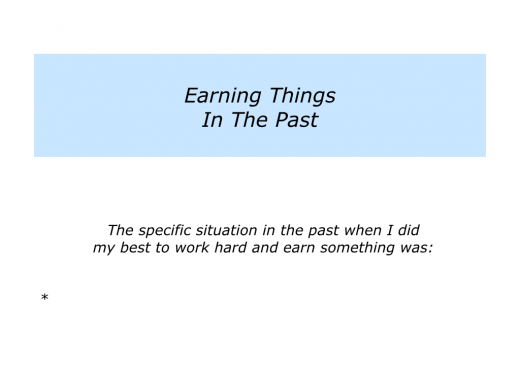
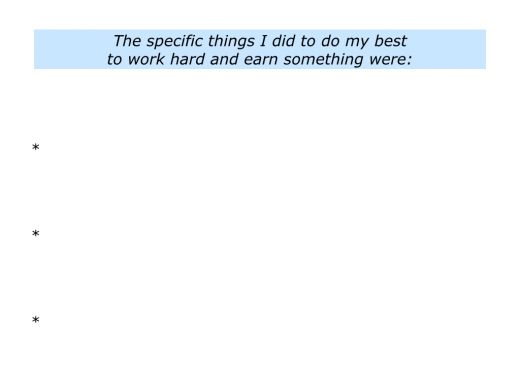
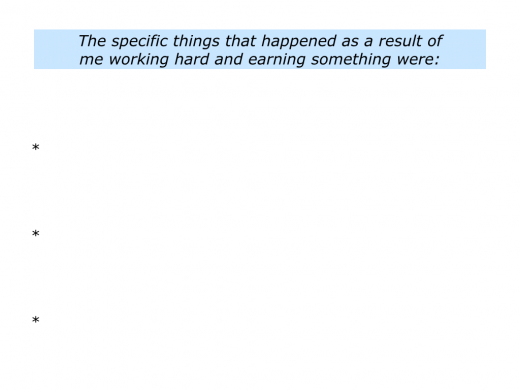
An interesting piece of advice is now given to young people who can choose from several options in their career. This is as follows.
“At some point, take a job you don’t like. Stick at it for several months.
“This may fire you up – or get you angry – so that, when you get a job you like, you will work at it like crazy.”
People who deliver high standards often feel privileged to pursue their chosen work. They may have earned the right to do it, but they still act as if they are fortunate. Some people, however, feel it is their right to get paid for just being.
Let’s look at two examples I encountered when working with a company. The business put two outside consultants on retainers, but each behaved differently.
Consultant A had a contract for two days a month. They were proactive, highly professional and worked more than their two days.
They kept in touch with the stakeholders and delivered success. They also looked ahead to the forthcoming months and, when appropriate, suggested possible assignments.
Several times the company had to cancel the agreed two days work at the last minute. The consultant could have stayed away and still picked up their retainer.
Instead, they chose to come into the office and make themselves useful. They embodied the ethic of earning things, rather than entitlement. They focused on how to help the business to succeed.
Consultant B had a similar contract, but demonstrated a different attitude. They waited for the company to give them assignments and then had to be chased up.
They seemed to think that simply being from the big name consultancy was enough to justify their retainer. It wasn’t.
Let’s consider another example. One soccer club I know has the policy of taking young players on season-long loans from top clubs.
These talented youngsters have a history of being star players at every age level. When such prodigies join the top clubs, however, they find the competition is enormous. Sometimes they find five or six players ahead of them in their chosen position.
The young players are therefore loaned out. Some bidding clubs promise such youngsters an immediate first team place.
The Head Coach of the club mentioned, however, takes a different approach. He explains:
“We tell the young player that they will have to fight for a place. If they feel they can just turn up and waltz into the team, then we suggest they go somewhere else.
“Their parent club, however, wants them to get into the habit of competing for a place. The player is no use to them if they can get into a loan team without working.
“We also tell the young player that the first three months will be hard. We say:
‘You will think you have made a huge mistake. If you stick at it, however, you will get your chance. Providing you work hard, you will see a big development in your game.’
“We then leave the choice to the young player. If they want to come, that is great. If not, they are not the player for us with our work ethic. We have built a reputation for helping young stars develop.”
Let’s return to your own life and work. Looking to the future, can you think of a situation where you want to do your best to earn something, rather than simply feel entitled to it?
If you wish, try tackling the exercise on this theme. This invites you to do the following things.
Describe the specific situation where you may want to do your best to work hard and earn something.
Describe the specific things you can do then to do your best to work hard and earn something.
Describe the specific outcomes that may happen a result of you going through these steps.
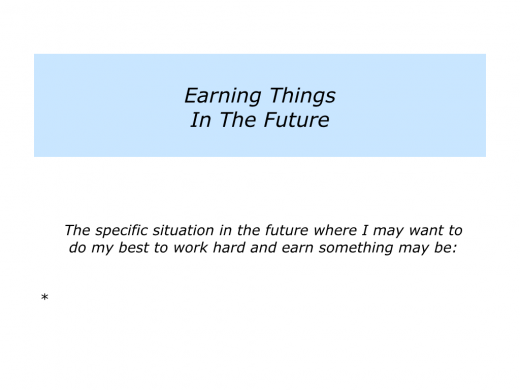
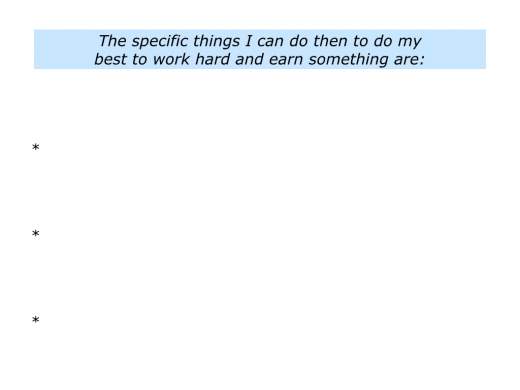
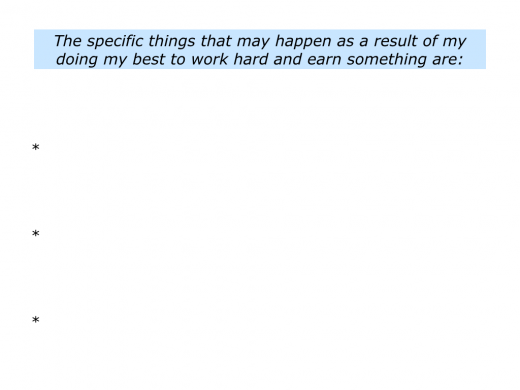






Leave a Reply